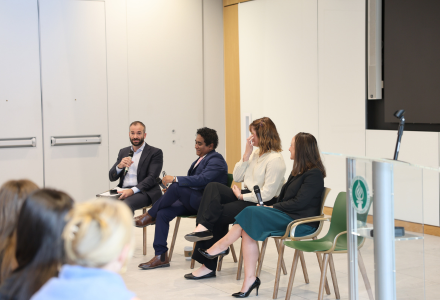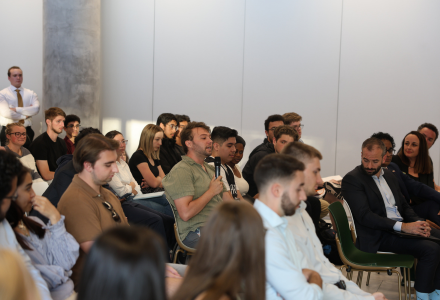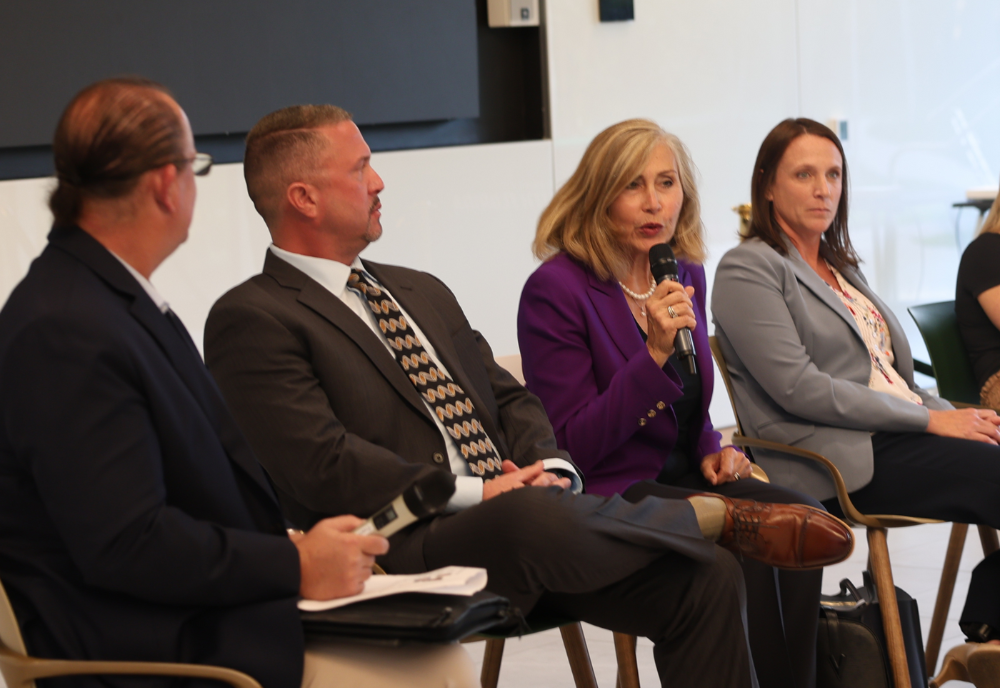In collaboration with the University of South Florida’s Global and National Security Institute (GNSI), the Office of National Scholars hosted a multi-panel event on October 23, 2024, for students interested in national and global security careers. Held in in the Judy Genshaft Honors College, the room was packed as attendees listened to panelists from various government agencies and USF offices. Moderated by GNSI Senior Research Fellows Robert Burrell and Jeffrey Rogg, the panels provided students with perspectives from experienced professionals.

The first panel featured professionals from the CIA, FBI, Department of State, and Department of Homeland Security. Each panelist answered questions from Burrell about their career paths and the most impactful moments of their work. Retired Foreign Service Officer Lynne Platt recounted being in NATO offices in Brussels during the September 11, 2001, terrorist attacks, marking the first and only time NATO invoked the collective defense clause, known as Article 5, which states that an armed attack against one member is an attack on all member nations.
Students paid close attention as the panelists shared stories of incredible moments
protecting people and assets around the world. Department of Homeland Security Special
Agent on Human Exploitation Matthew Brooks recounted the discovery of $2.2 billion
worth of uncut emeralds the size of a torso during an investigation. However, each
panelist emphasized that building a successful career takes time, encouraging students
to take the leap and get started.
The second panel featured Office of National Scholars Director Sayan Basu, Executive
Director of the Center for Career and Professional Development Addye Buckley-Burnell,
and Honors College senior Ashley Parow. Rogg facilitated a discussion in which they
shared practical advice for preparing for national security careers, including the
study of critical need languages and pursuing scholarship and fellowship programs.
About the importance of the event, Dr. Basu said, “This is the age of emergencies. Yet, for most undergraduate students the national security world remains shrouded in mystery. ONS and GNSI organized this event to demystify career paths to expose why each one of us can have a role in protecting nations and peoples.”
STUDENTS ON THE PATH TO NATIONAL SECURITY

GNSI and ONS are impacting students who will be the next generation promoting peace
worldwide. Ashley Parow, an international studies major and Arabic minor, is focused
on combating human trafficking and mitigating the causes of human exploitation, including
forced migration, social exclusion, and poverty. Other students, like Christopher
Oueis, who plans to use big data to promote development in the Middle East, are already
starting to tackle today’s biggest challenges. Oueis has had a long-standing connection
with the national security field having interned previously as a Conflict Tracker
at the Tampa-based US Central Command (CENTCOM), formerly directed by retired General
Frank McKenzie, who is now the Executive Director of GNSI. Oueis has also held several
appointments at think tanks, such as the American Task Force on Lebanon, and the American
Foreign Policy Council, focusing on the intersection between human security and development.
His success story is among the many reasons that Rogg was inspired to establish the
Future Strategist Program, which mentors both undergraduates and graduate students
as they find their paths in national security careers.
"At USF, we are committed to providing students with opportunities that connect their
academic experiences to real-world careers," said Charles Adams, dean of the Honors
College. "Hosting events like these not only broadens students' understanding of career
paths in fields like national security but also equips them with the insights and
connections essential for successful transitions beyond college."
Students interested in national security careers should visit the GNSI or the Office of National Scholars website.
